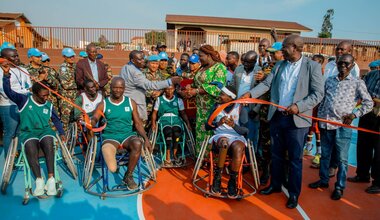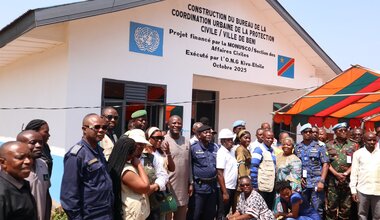Uvira: About 50 young people made aware of the fight against hate speech
"We, young people, must change our mentality. We must not give in to politicians' whims, as they get us nowhere. Our future depends on it. When you see the worthlessness of a message, you know there is no point in sharing it. We must avoid spreading hate messages".
The statement is by Asumani Jeanne Love, president of the youth of Songo district, in the town of Uvira, South Kivu, speaking on June 15, 2022, at the end of an awareness raising session about hate messages and speeches, conducted by the United Nations Joint Human Rights Office (UNJHRO).
Along with her, nearly fifty local leaders from state institutions, youth, civil society as well as ethnic mutualities took part in this activity which is part of the United Nations strategy against hate speech launched in 2019 by the UN Secretary General, Antonio Guterres.
Threat to the protection of civilians
For this activity's facilitator, Germain Musombo of UNJHRO/MONUSCO, "hate speech and messages are a threat to the protection of civilians. That is why we must fight them, we must anticipate in order to prevent the worst," he said. He also explained the international instruments that repress this kind of message.
For his part, the public prosecutor at Uvira's high court outlined the national legal framework that punishes ethnic, tribal and racial hate speech. The different speakers invited the participants to delete such messages instead of sharing them, and to discourage the authors thereof.
Pointing to a concrete case, the spokesperson for the Citizen Commitment for Change Movement (ECCHA), Samy Bitangalo, mentioned the recent looting of a church belonging to a local community as a result of messages inciting hate.
"They attacked and vandalized the church building of our Banyamulenge brothers following the story of the kidnapping of children. It was suspected that there were weapons hidden in the church. After investigations, it turned out that it was only a pretext, a lie. They were messages that were spread in social networks and that produced these effects", he said.
Warning to the perpetrators
During the discussions, participants noted that Uvira's young people are both victims and perpetrators of the propagation of these hate messages through social networks, especially during the present crisis in North Kivu.
So, the chief inspector of the military prosecution office at the Garrison Court, Major Buroko Bahati, issued a warning to both civilians and those holding State authority, including men and women in uniforms, to prevent them from committing such acts.
"The law is clear. Any person found, caught inciting hatred between communities, between populations, is punishable by law. And it is the Congolese penal code that punishes. It is a question of finding the one responsible, the one who incited, we will then arrest him according to the Congolese code," he said.
Inspector Buroko Bahati regretted that such acts are not reported more so they can be punished. He warned, however, that "any civilian inciting others to hatred, we will seize him, we will put him on trial, and we will bring him before his natural judge, the civil prosecutor. Any soldier who is caught will be severely punished and sentenced. As for soldiers, since we talk about discrimination and incitement to commit acts contrary to the law, the law is there to punish them. That is the military penal code".
The activism of local and foreign armed groups, customary power conflicts, and land conflicts that plague the region are believed to be the source of hate messages, according to the UNJHRO. This is why the United Nations is stepping up its awareness-raising activities against these phenomena. After Uvira, the UNJHRO team flew to the town of Baraka, in Fizi territory, to pursue the same awareness activities.
 UN
UN United Nations Peacekeeping
United Nations Peacekeeping






